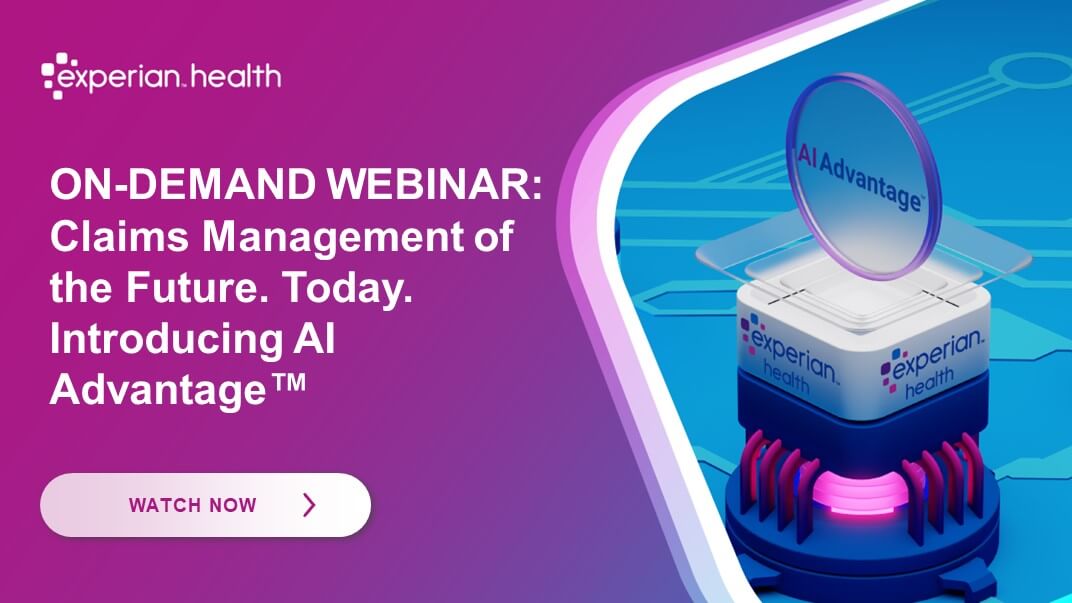At A Glance
Denial management is the process of addressing why healthcare claims are rejected or denied, instead of resolving them after they occur. This article explores denial management strategies, why outdated processes fail and how AI-driven solutions can help reduce denials and streamline workflows.
Key takeaways:
- Understanding why a claim is denied helps providers future-proof new claim submissions and reduce the need for costly reworks.
- Outdated, manual denial management processes often result in lost revenue, patient frustration, and a heavy administrative burden on staff.
- Organizations that adopt AI-driven denial management solutions, like Experian Health’s Patient Access Curator™ (PAC), typically see fewer denied claims, while maximizing revenue.
Claim denial rates are climbing in healthcare, with more than half of providers reporting an increase, according to Experian Health’s State of Claims 2025 report. When payers don’t pay, more of the bill falls to patients, many of whom already struggle to afford medical costs.
Data-driven denial management solutions help providers stay on top of denied claims. With the right strategies in place, organizations can quickly understand the root cause of denials in healthcare and prevent them before they occur.
This article looks at the importance of managing denied claims, and provides strategies to shift from offense to defense – using artificial intelligence (AI) denial management tools like Experian Health’s Patient Access Curator.
What is denial management in healthcare?
Denial management in healthcare is the process of handling claims that have been denied, suspended, pending or lost. It allows organizations to identify the reason for rejection, rework claims for resubmission more effectively and improve cash flow.
Many organizations still rely on manual denial management processes. However, these inefficient systems often come at a cost for providers — especially those already facing staffing shortages and thin operating margins.
How does denial management fit into revenue cycle management (RCM)?
In healthcare, denial management falls under claims management — a critical revenue cycle process that ensures providers are paid for the care delivered. Claims management spans the entire revenue cycle and involves preparing, submitting, and following up on claims.
When claims are denied, providers use denial management to identify the reasons and rework the claim for quick resubmission.
Why is denial management important in healthcare?
Denial management is important in healthcare to understand why payers didn’t approve a claim and reduce future denied claim rates. Four in ten providers say claims are denied at least 10% of the time, and 90% of claims denials require some level of human review, according to Experian Health’s 2025 State of Claims report.
Denied claims are expensive and add administrative burden, and the average cost of rework is $25 for providers and $181 for hospitals. Although more than 40% of healthcare organizations are understaffed, 90% of reworks require at least some human review, according to Experian Health survey data. As denials become increasingly common, providers must take action to improve their denial management processes.
How does the denial management process work?
The healthcare denial management process typically involves four key steps:
- Tracking. Monitor all claims from submission through final adjudication and identify denials as quickly as possible.Denied claims should be categorized by type, payer and service to identify trends and understand underlying issues that need addressing.
- Investigation. Determine the cause of each denied claim, such as coding errors, missing documentation or non-adherence to payer guidelines.This stage often involves collaboration among billing teams, coders and clinicians to pinpoint what went wrong.
- Rework. Rework the claim by gathering missing data or documents and correcting errors before resubmitting the claim to the payer for reconsideration.This step also includes monitoring the outcome to see if the appeal is successful.
- Prevention. Get ahead of future denials through improvement measures like staff training, updates to billing software and ongoing payer policy reviews.A preventive approach ensures claims are managed without a hitch and keeps revenue flowing.
What are the best strategies for effective healthcare denial management?
At a foundational level, adopting automation-based denial management solutions, like Experian Health’s Denial Workflow Manager, allows providers to manage denied claims more effectively and maximize reimbursements.
Implementing technology that prevents denied claims before they occur and processes denials faster helps healthcare organizations take denial management even further. Providers should consider denial management strategies that focus on gathering accurate data at registration and prioritizing top claims for rework based on revenue potential.
Prevent denials with more accurate upstream patient access
Incomplete or inaccurate information are the top reasons for claims denials, with bad data often originating at registration. Just over a quarter (26%) of providers say that at least one in ten denied claims can be traced back to intake errors, according to Experian Health survey data.
Addressing errors on the front end is critical to catching errors before they create more headaches downstream. Tightening up patient access processes helps providers ensure accurate data collection, curb denials and avoid costly reworks.
Tools like Experian Health’s Patient Access Curator automatically find and correct patient data within seconds—across eligibility, Coordination of Benefits (COB) primacy, Medicare Beneficiary Identifiers (MBI), demographics and insurance discovery. Machine learning and predictive analytics identify and correct bad data in real-time, eliminating the need for guesswork.
Process denials more efficiently with AI-powered solutions
Cutting-edge tools, like Patient Access Curator and AI Advantage™ from Experian Health, are reshaping denial management workflows with artificial intelligence (AI).
On the front end, Patient Access Curator utilizes AI to automatically verify and validate patient information, such as insurance details and eligibility. At the same time, AI Advantage works on the backend to predict and prevent denials.
AI Advantage’s two offerings, Predictive Denials and Denial Triage, work across two key stages. This solution leverages data for proactive claim intervention and prioritizes denials based on value. This allows busy staff to reduce time spent on denial management.
Here’s a closer look at how Experian Health’s AI Advantage two-stage process works:
- Stage 1: Predictive Denials uses AI and machine learning to look for payer adjudication patterns and identify undocumented rules that could result in new denials. It also flags claims with a high potential for denial, allowing the right specialist to intervene before it’s sent to payers.
- Stage 2: After a claim has been denied, Denial Triage uses advanced algorithms to identify and segment priority claims based on their potential value.
Together, Experian Health’s Patient Access Curator and AI Advantage form a closed-loop system. With these solutions, healthcare organizations benefit from a smarter, faster and more scalable way to reduce denials and increase reimbursements, while freeing up staff to focus on other priorities.
The bottom line: What can healthcare leaders expect for the future of denial management?
The future of denial management in healthcare hinges on efficiency and accuracy. Solutions that leverage artificial intelligence are expected to be game-changers for the industry. Providers that rely on outdated and expensive manual processes must prioritize technology-based solutions to keep up. With these tools, healthcare organizations can better eliminate guesswork, minimize the denial spiral and reduce financial losses from denied claims.
See how AI Advantage and Patient Access Curator are helping Experian Health’s clients transform patient access and claims management.



